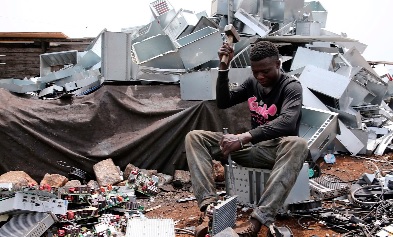
Lead poisoning: A menace in Ghana
Lead poisoning in Ghana has been a significant public health concern with historical implications. Lead poisoning has emerged as a grave health concern affecting children across the globe.
Advertisement
A report named “The Toxic Truth” jointly released by Pure Earth and UNICEF brings to light the severity of this issue in Ghana, with alarming findings that demand urgent attention and action.
The report sheds light on the prevalence of lead poisoning among children in the country, its devastating consequences and the urgent need to address the underlying causes.
According to Pure Earth and UNICEF’s report, up to 800 million children worldwide, equivalent to one-third of all children, have blood lead levels at or above five microgrammes per deciliter (ug/dL), the level that requires immediate action.
Shockingly, Ghana has not been spared from this dire strait, as a considerable number of children in the country are affected by lead poisoning.
One of the leading sources of lead poisoning in Ghana is the informal and substandard recycling of lead-acid batteries and improper disposal of electronic waste.
This hazardous practice puts countless children at risk as they are exposed to toxic lead through contaminated air, water and soil.
Report
The report highlights that up to 50 per cent of lead-acid batteries in low-and-middle-income countries like Ghana are processed informally, leading to an increase in childhood lead exposure.
It is estimated that a lot of children in Ghana have high blood lead levels, which is serious and requires attention to be resolved.
The consequences of lead poisoning in Ghana have been devastating.
Lead is a potent neurotoxin that can have severe impacts, especially on children and pregnant women.
It can affect the central nervous system, leading to developmental delays, learning disabilities, and behavioural problems in children.
Adults can also suffer from health issues such as cardiovascular problems, kidney damage and reproductive issues.
Lead poisoning has far-reaching implications on public health, education and economic productivity.
Children affected by lead exposure may face long-term challenges, hindering their potential and contributing to societal burdens.
The report warns that this adverse effect can have far-reaching consequences for children’s future and Ghana’s overall development.
Apart from its devastating health effects, childhood lead exposure also carries a staggering economic burden for Ghana.
The report estimates that the economic cost of lead poisoning in low- and middle-income countries amounts to nearly USD 1 trillion due to the lost economic potential of the affected children over their lifetimes.
Ghana cannot afford to overlook this crucial aspect of the lead poisoning crisis.
Childhood lead exposure
Pure Earth and UNICEF are collaborating to combat the menace of childhood lead exposure in several countries, including Ghana.
Their efforts focus on solving this health threat at its roots and preventing further harm to vulnerable children.
The report emphasises the importance of immediate action to put an end to the informal recycling of lead-acid batteries and implement safer and more sustainable methods.
The Ghanaian government, along with civil society organisations, healthcare professionals and stakeholders, must come together to address the lead poisoning issue.
Raising awareness among communities, enforcing stringent regulations on lead recycling practices, and providing access to health services for affected children are vital steps in mitigating the crisis.
Pure Earth and UNICEF’s report have brought to light the grave scale of lead poisoning among children in Ghana.
These measures require collaborative efforts from the government, non-governmental organisations (NGOs), industries and communities to address lead poisoning effectively in Ghana and safeguard public health.
As a nation, we cannot turn a blind eye to this menace that threatens the well-being of our future generation.
The time to act is now! It is imperative for all stakeholders to unite, implement effective strategies and prioritise the health and safety of our children.
By taking swift and decisive action, we can safeguard our children’s future and build a healthier and more sustainable Ghana for generations to come.
The improper recycling and disposal of electronic waste in Ghana contribute to lead poisoning.
A report by the Basel Convention Regional Centre for Africa (BCRC- Ghana) in 2020 revealed that e-waste recycling activities in Ghana, particularly in the Agbogbloshie area of Accra, led to hazardous lead exposure for both workers and nearby residents.
Pure Earth Ghana
Pure Earth Ghana is an environmental health international non-governmental organisation (INGO) headquartered in New York, United States.
Pure Earth works in low and middle–income countries experiencing the worst of the pollution crisis, suffering from high levels of death, disease and disability, especially children and pregnant women.
Pure Earth is strong in creating awareness of lead poisoning in Ghana.
Pure Earth partners with international organisations, governments, communities and the media to implement solutions that stop toxic exposures, protect health and restore environments.
Pure Earth prioritises actions to protect the developing brains and bodies of children and pregnant women living in toxic hot spots.
The writer is the Communications Officer of PURE EARTH
Email: [email protected]




